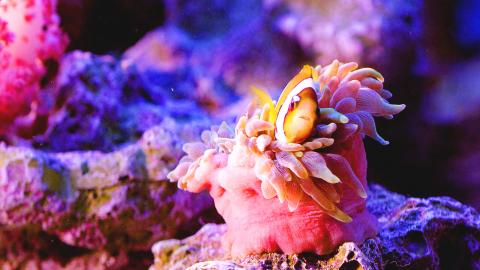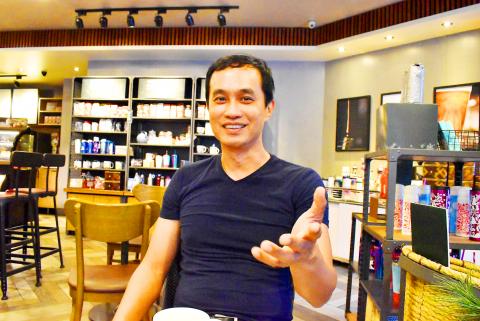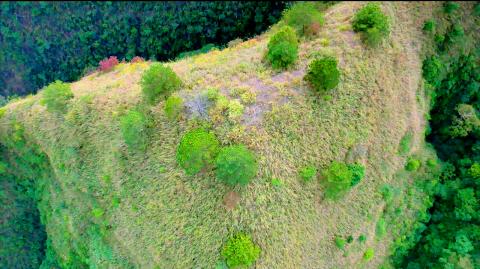Chu Chuan-li (曲全立), who this September released his latest work, Formosa 3D (美力台灣3D), says he has not changed his style, despite converting from a director of commercial TV shows to one devoted to environmental documentaries.
“I have never changed. I have focused on ‘content’ by playing with four elements — video, music, images and text,” Chu told the Taipei Times.
A resourceful director who has produced numerous musical videos, TV commercials and variety shows, Chu, now 51, is also one of the nation’s forerunners in developing 3D movies.

Photo courtesy of Activator Marketing Co
In 2013, he won the Harold Lloyd Award for 3D Taiwan, along with director Ang Lee (李安) for Life of Pi.
In 2002, Chu was diagnosed with a brain tumor that affected his sight, hearing and ability to eat.
After undergoing 28 hours of surgery, the left half of his body no longer functions properly.

Photo: Lin Chia-nan, Taipei Times
“After the surgery, I felt I must seize the time to do what I want. On top of that, I got a coronary stent last year and more recently found that I have sleep apnea,” he said. “I feel like I am about to die every night.”
His latest documentary, Formosa 3D, which is to be screened nationwide from Dec. 22, offers viewers glimpses into the lives of more than 60 artisans and scientists, ranging from blacksmiths, puppet painters, straw sandal makers and bamboo steamer makers to researchers of butterflies indigenous to Taiwan.
Most characters in the film are just ordinary people, rather than well-known figures in their professions, Chu said.

Photo courtesy of director Chan Chia-lung
When he set out to collect the stories of local artisans in 2008, he was rejected by many so-called masters, because he did not have a platform to broadcast his videos, Chu said.
“In hindsight, that was the best thing that happened,” he said. “Ordinary people are more open and honest.”
In the second part of the movie, Chu addresses marine pollution and overfishing by showing the beauty of the seas around Taiwan.
Only a beautiful land can nurture lovely people, he said.
“Loving Taiwan should not be reduced to a simplistic slogan,” he added.
Chu’s work is almost devoid of the generational conflict witnessed in Taiwanese society in recent years.
Straw raincoat maker Wu Tsao-ta (吳草塔) of Hsinchu County said he had dissuaded his children from inheriting his business, as he knows they would not be able to support their families.
Asked to address generational conflict, Chu’s eyes instantly blurred with tears.
“I am a descendant of Chinese immigrants, just like late director Chi Po-lin (齊柏林),” Chu said. “I am frustrated and angered whenever I see people try to incite discord between ethnic groups.”
“I want to leave more heritage, such as documentaries about the nation’s natural and cultural landscapes, to the next generations,” Chu said. “All I can do is document things. I am not good at writing or other things. I hope to present my works accumulated over the past 10 years to viewers with utmost sincerity.”
One of the experts appearing in Chu’s film, Chan Chia-lung (詹家龍), has also become a director and his latest work, Bao Dao (保島), premiered at Taipei’s Spot Huashan Cinema on Friday last week.
Previously known for his discovery of the migratory route of Taiwanese milkweed butterflies, Chan is now a conservationist and a director of documentaries.
“Before I worked to protect butterflies, I did not like to talk to people much,” Chan, 47, said. “Butterflies made me shut out the rest of the world, but they also broadened my view of the world.”
To track the migratory route of butterflies, he used to catch them and leave identifying marks on their wings without caring too much about their pain, Chan said.
He did not become aware that was wrong until butterfly lovers challenged the way he treated the vulnerable creatures so carelessly, Chan said, adding that he was then compelled to modify his views on other living beings.
In Bao Dao, a work commissioned by the Forestry Bureau to document the nation’s conservation areas, Chan employs the names of human body parts to characterize a variety of geological features.
The Central Mountain Range is compared to a spine, while rivers are portrayed as arteries. Forest wetlands are eyes; estuary wetlands are livers and kidneys; rain forests are lungs; and vegetation is skin.
Badlands are likened to the appendix. They are seemingly useless, but they also contain “seeds of life.”
While many scenes are shot from a bird’s-eye view — a technique also used in Chi’s Beyond Beauty: Taiwan From Above (看見台灣) — Chan also offers thrilling closeups of the nation’s wildlife.
He captures the moment a green snake opens its mouth and swallows a frog alive, with the scene blacking out immediately after the frog is eaten.
To make his work more dynamic than other environmental documentaries, Chan makes frequent use of time-lapse and high-speed photography.
“Some people asked me why the snake eating a frog scene is so fleeting,” Chan said. “Actually, that is deliberately to make the viewer want to look for more.”
While Bao Dao is largely about conservation areas and major wildlife habitats, it also includes a scene in which a monkey picks up a snack by a roadside, tearing open its plastic package to eat it.
The scene was not set up, it just happened while Chan was filming in Yushan National Park.
Taiwan is like a beautiful and vulnerable woman, Chan said.
“Its beauty is also derived from its vulnerability,” he added.
After Chi’s success with Beyond Beauty: Taiwan From Above, which reaped a record NT$200 million (US$6.66 million) at the box office, many photographers adopted aerial photography, but not everyone had a clear idea about what they wanted, Chu said, adding that “content” is far more significant than the techniques used.
While some critics have said Chi’s work offers a simplistically utopian vision without probing deeper into environmental issues, National Chung Hsing University professor Chiu Kuei-fen (邱貴芬) considers it a success because it prompts people to identify with the “sublime” natural environment through its spectacular effects.
Mainstream movies are not necessarily inferior to independent films that highlight social movements, Chiu wrote in Regarding Taiwan: The New Taiwan Documentary (看見台灣:台灣新紀錄片研究).
Mainstream films go hand-in-hand with society’s dominant forces, but they can also wrestle with those forces and help build the power of the public, she wrote, adding that the “politics” of documentaries should be examined in more nuanced ways.

ALIGNED THINKING: Taiwan and Japan have a mutual interest in trade, culture and engineering, and can work together for stability, Cho Jung-tai said Taiwan and Japan are two like-minded countries willing to work together to form a “safety barrier” in the Indo-Pacific region, Premier Cho Jung-tai (卓榮泰) yesterday said at the opening ceremony of the 35th Taiwan-Japan Modern Engineering and Technology Symposium in Taipei. Taiwan and Japan are close geographically and closer emotionally, he added. Citing the overflowing of a barrier lake in the Mataian River (馬太鞍溪) in September, Cho said the submersible water level sensors given by Japan during the disaster helped Taiwan monitor the lake’s water levels more accurately. Japan also provided a lot of vaccines early in the outbreak of the COVID-19 pandemic,

Kaohsiung Mayor Chen Chi-mai (陳其邁) on Monday announced light shows and themed traffic lights to welcome fans of South Korean pop group Twice to the port city. The group is to play Kaohsiung on Saturday as part of its “This Is For” world tour. It would be the group’s first performance in Taiwan since its debut 10 years ago. The all-female group consists of five South Koreans, three Japanese and Tainan’s Chou Tzu-yu (周子瑜), the first Taiwan-born and raised member of a South Korean girl group. To promote the group’s arrival, the city has been holding a series of events, including a pop-up

TEMPORAL/SPIRITUAL: Beijing’s claim that the next Buddhist leader must come from China is a heavy-handed political maneuver that will fall flat-faced, experts said China’s requirement that the Dalai Lama’s reincarnation to be born in China and approved by Beijing has drawn criticism, with experts at a forum in Taipei yesterday saying that if Beijing were to put forth its own Dalai Lama, the person would not be recognized by the Tibetan Buddhist community. The experts made a remarks at the two-day forum hosted by the Tibet Religious Foundation of His Holiness the Dalai Lama titled: “The Snow Land Forum: Finding Common Ground on Tibet.” China says it has the right to determine the Dalai Lama’s reincarnation, as it claims sovereignty over Tibet since ancient times,

Temperatures in some parts of Taiwan are expected to fall sharply to lows of 15°C later this week as seasonal northeasterly winds strengthen, the Central Weather Administration (CWA) said today. It is to be the strongest cold wave to affect northern Taiwan this autumn, while Chiayi County in the southwest and some parts of central Taiwan are likely to also see lower temperatures due to radiational cooling, which occurs under conditions of clear skies, light winds and dry weather, the CWA said. Across Taiwan, temperatures are to fall gradually this week, dropping to 15°C to 16°C in the early hours of Wednesday